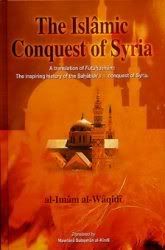

http://forum.mpacuk.org/showthread.php?t=21286
The Islamic Conquest of Syria is the first English translation of Futuh ush-Shaam, the ninth century Arabic classic which details the Muslim advance into Syria.
The English reader has, for the first time, the opportunity to read about the great epic struggle of a small ill-equipped band of Muslims that overthrew the superpower of their day.
Events that have been only briefly mentioned in other books are graphically described. Such as the Battle of al Yarmuk which changed the course of world history.
The great personalities of early Islam are brought to life in a unique way.
The strategies of Khalid bin al-Walid(ra), the piety of Abu `Ubaydah Ibn al-Jarrah (ra) the bravery of Dirar al-Kindi and many more are vividly described..
The text also sheds light on some lesser known aspects of Islamic history such as the significant role of women and the Roman princes who had embraced Islam.
Al-Imâm al-Wâqidî
The author of this book is al-Imâm Abû ‘Abdillâh Muhammad bin ‘Umar al-Wâqidî al-Madanî who was born at the beginning of 130 Hijrî in al-Madînah al-Munawwarah. His surname is derived from his grandfather’s name, Wâqid, and thus he became famous as al-Imâm al-Wâqidî. He began his studies in Madînah. Amongst his prominent teachers were Ibn Abi Dhahab Ma’mar bin Râshid, al-Imâm Mâlik bin Anas and al-Imâm Sufyân ath-Thawrî. Initially he earned a living as a wheat trader, and when a calamity struck he migrated to Irâq in 180 Hijrî during the reign of Mamûn ar-Rashîd, there Yahyâ al-Barmakî welcomed him due to his great learning and he was included as one of Mamûn’s elite. He was soon appointed as judge and held this post until his death on 11 Dhul Hijjah 207 Hijrî. He is buried in the graveyard of Khayzarân.
The Imâm was both a Muhaddith and Historian but since he concentrated on History, his hadith narrations need to be scrutinised before acceptance whereas he is doubtlessly acknowledged as a master of History. Besides Futûh ush-Shâm, al-Imâm al-Wâqidî also wrote:
· Al-Maghâzi an-Nabawî (Campaigns of the Prophet SAW)
· Fath Ifrîqiyah (Conquest of North Africa)
· Fath al-‘Ajam (Conquest of Irân)
· Fath Misr wal-Iskandrîyah (Conquest of Egypt and Alexandria)
· Akhbâr Makkah (Narrations of Makkah)
· At-Tabaqât (The Generations)
· Futûh al-‘Irâq (Conquest of Irâq)
· Sîrah Abî Bakr wal-Wafât (Life and death of Abû Bakr RA
· Kitâb as-Sardah (Birth of the Prophet SAW
· Tarîkh al-Fuqahâ (History of the Jurists)
· Kitâb al-Jamal (Battle of the Camel)
· Kitâb as-Siffîn (Battle of Siffîn)
· Maqtal al-Husayn (Killing of al-Husayn SAW
· Tafsîr al-Qurân etc.
Ash-Shâm
The word ‘Syria’ as used in this book refers not to the area of the modern republic, but to the larger ancient region called ‘ash-Shâm’ in ‘Arabic. It bears great significance in Islâm viz. the Qurân calls it a ‘Blessed Land.’ In it is al-Masjid al-Aqsâ; it is home to more Prophets than any other land; many Prophets are buried there, such as Ibrâhim رضي الله عنه; many Sahâbah are buried there, such as Mu’âwiyah رضي الله عنه ; Syrian ‘Ulamâ are countless, for example, al-Imâm an-Nawawî. Syria has produced many great warriors (as-Sultân Nûruddîn) and martyrs (ash-Shaykh ‘Abdullah Azzâm). ‘Isâ عليه السلام will descend in Damascus and have his capital at Baytul Muqaddas; ad-Dajjâl will be slain at Lud; the Abdâl are mostly found in Syria; and Syria is the Place of Gathering for Judgement Day.
No comments:
Post a Comment